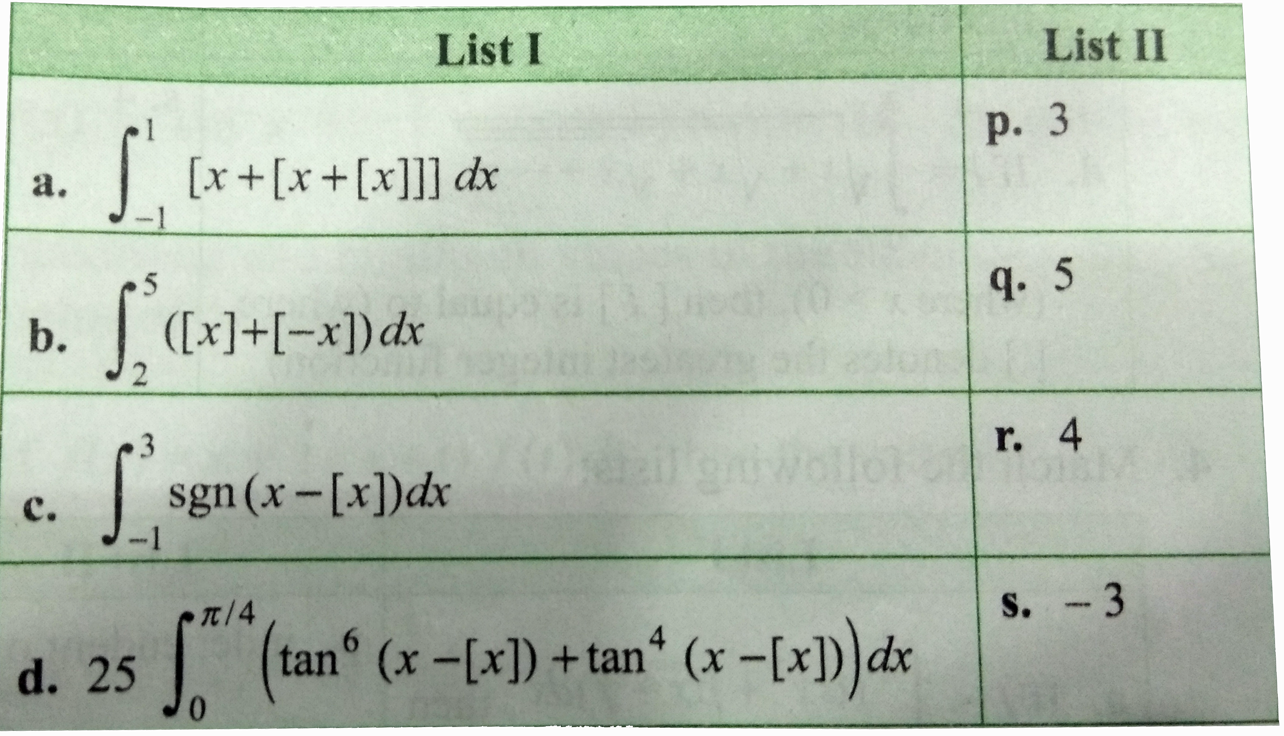LetJ=∫−4−5(3−x2)tan(3−x2)dxandK=∫−1−2(6−6x+x2) tan(6x−x2−6)dx.Then(J+K) equals _____
The correct Answer is:0
We have J=∫−4−5(3−x2)tan(3−x2)dx
Put (x+5)=t. Then
J=∫10(3−(t−5)2)tan(3−(t−5)2)dt
=∫10(−22+10t−t2)tan(−22+10t−t2)dt
Now K=∫−1−2(6−6x+x2)tan(6x−x2−6)dx
Put (x+2)=z. Then
K=∫10(6−6(z−2)+(z−2)2)tan(6(z−2)−(z−2)2−6)
=∫0(22−10z+z2)tan(−22+10z−z2)dz
Hence (J+K)=0
Topper's Solved these Questions
- DEFINITE INTEGRATION BOOK - CENGAGECHAPTER - DEFINITE INTEGRATION EXERCISE - JEE Main Previous Year
12 Videos
- DEFINITE INTEGRATION BOOK - CENGAGECHAPTER - DEFINITE INTEGRATION EXERCISE - JEE Advanced Previous Year
38 Videos
- DEFINITE INTEGRATION BOOK - CENGAGECHAPTER - DEFINITE INTEGRATION EXERCISE - Exercise (Matrix)
6 Videos
- CURVE TRACINGBOOK - CENGAGECHAPTER - CURVE TRACINGEXERCISE - Exercise
24 Videos
- DETERMINANTBOOK - CENGAGECHAPTER - DETERMINANTEXERCISE - Multiple Correct Answer
5 Videos
Similar Questions
∫π0[cotx]dx, where [.] denotes the greatest integer function, is equal to
View SolutionLet f be a non-negative function defined on the interval .[0,1].If ∫x0√1−(f'(t))2.dt=∫x0f(t).dt, 0≤x≤1 and f(0)=0,then
View SolutionIf [.] denotes the greatest integer function, then match the following lists:

View SolutionDraw the graph of y=sin2x−cosx
View SolutionIf x∈R,ai,bi,ci∈R for i=1,2,3 and ∣∣ ∣∣a1+b1xa1x+b1c1a2+b2xa2x+b2c2a3+b3xa3x+b3c3∣∣ ∣∣=0, then which of the following may be true ?
View SolutionLetJ=∫−4−5(3−x2)tan(3−x2)dxandK=∫−1−2(6−6x+x2) tan(6x−x2−6)dx.Then(J+K) equals _____
View SolutionIf tan^(-1)4=4tan^(-l)x, then x^(4)+x^(3)-6x^(2)-x+4 is equal to
View Solution∫206x+3x2+4dx
View SolutionIf ∫xlog 2du(eu−1)1/2=π6, then ex is equal to
View SolutionThe value of
∫π/40(tannx+tann−2x)d(x−[x]1!+[x]22!−[x]33!+....)
where [x] is greatest function, is
View Solution∫π/40ex(1+tanx+tan2x)dx=
View SolutionLimx→0tan(x)2−tan(x)3−tan(x)6sin2(x)(ex−1)
View SolutionThe value of I=∫π40(tann+1x)dx+12∫π20tann−1(x2)dx is equal to-
View SolutionThe value of I=∫π/40(tan⋅n+1x)dx+12∫π/20tann−1(x2)dx is equal to
View Solution∫π/40(Tann(x−[x])+Tann−2(x−[x]))dx
View SolutionLetJ=∫−4−5(3−x2)tan(3−x2)dxandK=∫−1−2(6−6x+x2) tan(6x−x2−6)dx. Then (J+K) equals _____
View Solution

